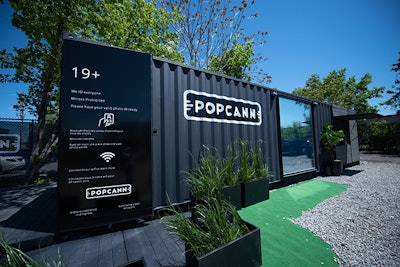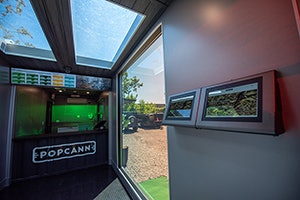
As the Canadian cannabis industry continues to settle in place, the retail experience remains the subject of much conversation. How will Canadian consumers engage with brands? What parts of the country need attention from the retail sector?
POPCANN, a new product line of prefabricated “pop-up” cannabis retail stores, is intent on learning more about the answers to those questions.
“We took a look at the business we were in—brand activation, media, experiential space and deploying marketing technologies for over 15 years—… and the problems and challenges that the cannabis industry was facing,” POPCANN co-founder and president Michael Girgis says, describing the company’s 2019 origin. “We've seen retail stores launching [and] we've watched the global industry, and we thought, ‘We can put our expertise in motion and develop a product that fills a gap in flexibility and creates a more modular retail experience.’”
The general idea behind POPCANN is a cannabis dispensary that can meet the market where natural gaps are forming. Girgis and his partner—co-founder and CEO Jake Neiman—point to Northern communities, seasonal towns and special events like music festivals as places that may benefit from efficient access to cannabis on a short- or medium-term basis.

POPCANN units can be brought in as turn-key solutions for a one-day event, or they can be situated in a town for months or years at a time. Girgis says the team took inspiration from companies like Starbucks, which have used prefab shipping containers as retail outlets in some cities.
The key to understanding the emerging marketplace is access. Get customers in the door, and then begin to understand how the market will play out in a place like Canada (or other countries).
“We're listening, we're watching, and we're hearing that there [are] certainly concerns in northern communities and harder-to-reach seasonal communities,” Girgis says. “There are locations that are not necessarily in the major cities, at the corners of major streets; there are non-traditional locations.”
To that end, POPCANN has also partnered with Storage Vault's portable storage division, a publicly traded self-storage business that will allow POPCANN to work with upwards of 200 non-traditional retail locations on Storage Vault property.
“They've done a lot of work to put these locations in the right place,” Girgis says. “So, they're not necessarily right in the city core; they certainly cover a vast [area] and allow us to look at locations that are dense but a little off the beaten path a bit—and certainly service regions that are not necessarily being serviced now or in the near future.”
The POPCANN move is a disruptive one, as Canadian provinces for the most part have already laid out cannabis retail regulations. The company is working within those parameters to offer another private solution to market access. Each POPCANN unit follows retail store compliance requirements: the units feature integrated locked vaults for cannabis products, a patent-pending age-gated entryway for consumers 19 and older and one-way windows and skylights around the structure; you can see out, but you can’t see in.
“The goal and vision is a global company,” Girgis says. “Looking at the very structure that we’re looking at, which is shipping containers, by virtue they can be shipped anywhere. And we're maintaining the authenticity of the structure itself.”
As 2019 goes on, the POPCANN team expects to announce more moves across Canada. It’s experimental, and Girgis says there are conversations in place with licensed producers to integrate POPCANN units more innately into the supply chain.
“One no-brainer application with the licensed producers is a freestanding POPCANN retail store on their facility,” he says. “So, it's kind of ideal, where they have their growing facilities and their cultivation facilities. They can have a purpose-built cannabis retail store designed to be fully secure, fully compliant, but provide that front-end retail experience to their overall cannabis production activity.”
With more cannabis news to come out of Canada in the coming months—including the legalization of new product categories, like edibles—POPCANN’s mission will be to find the ebb and flow of the marketplace, the gaps in access where consumer demand meets the structural capacity of a pop-up store.


























